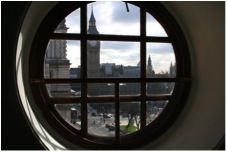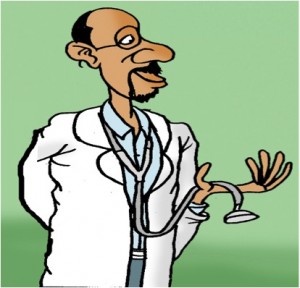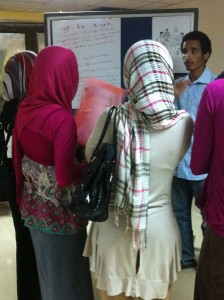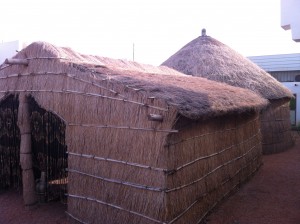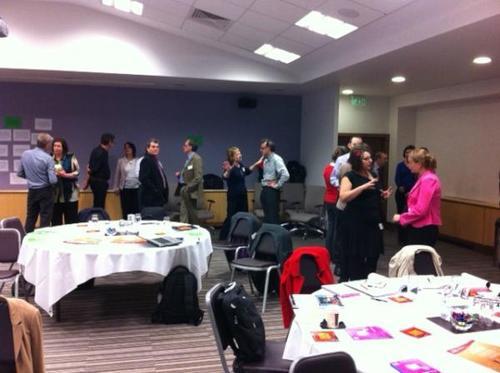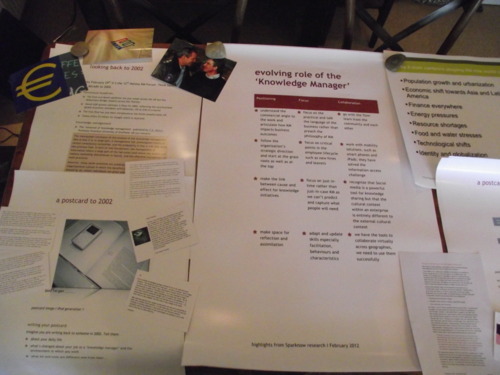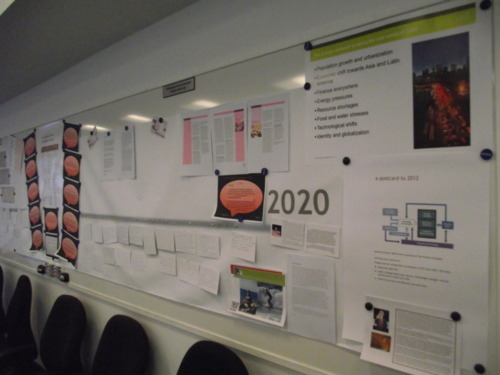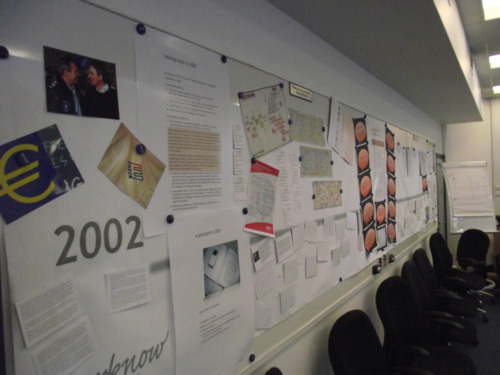In January as avid readers of the Sparknow blog might recall, Sparknow attended the inaugural knowledge management capacity development in Africa event in Khartoum. As part of the follow up to that event the conference chair and organiser Dr Gada Kadoda decided to use a postcard as a way of capturing some of the delegates perceptions. It showed a picture of some of the delegates on the steps of Freedom Hall Khartoum and an invitation on the reverse to submit comments and reflections.
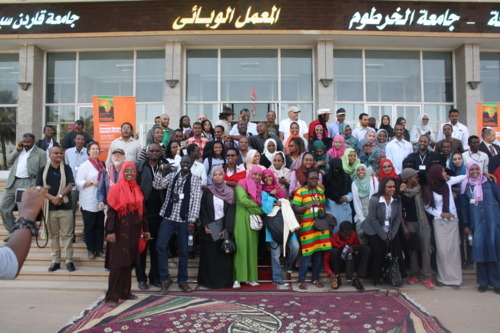
What follows is her candid account of how the exercise went and the postcards used as prompts throughout the evaluation session which was held in Khartoum on February 25th.
In due course I will publish something on how Sparknow used postcards at last week’s Henley KM Forum and invite Victoria Ward who pioneered the use of this technique in Sparknow to post her reflections.
Evaluation of KMCA2012 Using Post Cards
By Dr Gada Kadoda
For conferences and workshops, a survey is traditionally used to measure satisfaction rates of delegates with the programme content, event organisation, etc. against set criteria and predefined scales, as well as allow for narrative comments for respondents to elaborate or make a suggestion. The results of these surveys are usually published as numeric percentages reflecting satisfaction levels along the various parameters considered in the survey. In as much as many of us are more comfortable with scales and their apparent clarity, one could argue that they avert expressiveness rendering them inaccurate to map a memory or a feeling of the past.
The speed by which we fill these surveys can bear witness to how much we engage our memory while filling the evaluation form for an eager organiser. However, a creative or participatory evaluation method like using post cards can not only measure the same parameters, but it will also empower participants by involving them into defining their own parameters and bring out their vivid memories, good or bad, of the event.
We recently used this method to collect memories about the Workshop on Knowledge Management Capacity in Africa that was held from 4 to 7 January, 2012 in Khartoum, Sudan. We distributed a send-a-postcard-to-KMCA call to our mailing list to write back to the organisers and as with post cards, senders are free to choose what they write. There was a low response rate (5%) which is in part due to delay from our side in sending out the call, a month after the end of the workshop!
Notwithstanding this unimpressive rate, in this article I will explore the parameters that came out from our use of post cards that correspond to some of those commonly used in after-event-evaluation questionnaires. Ratings can only be felt as you read through the selection of post cards quotes.
General event assessment (e.g. relevance of content, personal benefits or difficulties):
“Thanks for the great job you did and KMCA2012 was very successful …” Walaa Mahdi (Graduate)
“Thanks t all those behind that great event and I hope to continue and organise more helpful and full of knowledge events.” Abdelrahman Idris (Participant)
“Good things about the workshop were the exchange of international students and the collaboration between professor, students and even business people, trust and joy moments between people, we open our minds to philosophy, anthropology and indigenous knowledge systems…” Tybian Zaroug (Undergraduate Student)
“Now after attending this conference, I can talk about knowledge management to my friends and colleagues. In fact I realised that KM is very important to any scientist…” Samah Makawi (Undergraduate Student)
“Actually I learnt a lot of things from this workshop in leadership and research and I am ready now to take bigger responsibilities, and as Mr. Paul said why not Sudan lead the world in KM, I totally support this and in our group on facebook KM friendship, we asked for ideas to be active and to establish a team work to achieve something in this country.” Iram Oshari (Paper Presenter)
“The only problem that faced me all the time, it was a lot of interesting paper and presentations and we couldn’t reach them all.” Islam Elhadi (Graduate)
Programme rating (e.g. quality of content and activities, schedule and time keeping):
“Thank you! It was a pleasure of mind to participate… I remember almost all the new ideas, the multidisciplinary yet united tribe of knowledge guards. What was most fascinating for me was the ideas on indigenous knowledge. What was striking, well, an anthropologist, a chemist, a philosopher and a political scientist … all using the same language … KM.” Omayma Gutbi (Participant)
“I remember since we moved from Kassala and we entered the hall of friendship, the movement of the people inside the hall from session to session and the ongoing debate about the topics presented in the various sessions … I hope these efforts translate to reality to develop health, education, environment, government and business in Sudan and Africa.” Alzubair Hassan (Postgraduate Student)
Event organisation (e.g. information to delegates, quality of facilities):
“Thanks for the great leadership and all your hard work, being at the airport for everyone, taking care of visas and all the other little things that made this such a success.” John Trimble (Keynote speaker)
“I would like to thank you all for the well organised workshop. All activities were impressive.” Awadia Awad (Participant)
“I found strange being asked to opine on subjects at a moment notice and without any briefing and the sanguine acceptance of Africa time.” Paul Corney (Invited Speaker)
“Please make sure to document every single second during the workshop on video. As time goes, few things could be remembered, so documentation is a very crucial part for the future.” Anwar Dafalla (Invited Speaker)
Notable quotes from frequent conference goers …
A true international Conference …
“My time Sudan was one of the most enriching experiences that i have had the pleasure and honor to partake of. Despite some late starts(!), the little hiccups and the waits, there was tremendous energy in the air and the people, all, including and especially the students, the faculty and the practitioners, many who were all three! The diversity of participants and thematic areas addressed in the “workshop” transformed and elevated this workshop into a true International Conference on Knowledge Transfer and Management. I learnt a lot, met many engaged and enthusiastic individuals, and was privy to participating in much intense and engaged discourse on empowering people and building Africa’s capacity.” John Tharakan (International Participant)
Exhilarating and free …
“In so many ways, it was one of the most exhilarating workshops I have attended. This was for many reasons: the range and diversity of topics contained within a KM framework; the diversity of the participants—in age, nationality, gender, institutional affiliation and field, etc.; and the free nature of the environment. This is in addition to some very stimulating papers. As a Sudan Studies scholar of many years, I found I still had a lot to learn and was able to find myself in an area of study outside my field. I was especially impressed with the presence of so many students and with their presentations the first day of the conference. Including art and crafts was a tour de force and tied in very well with the goal of the organizer of considering all forms of knowledge and knowledge production.” Sondra Hale (International Participant)
There was even some post card poetry:
“You set stone in stagnant water
You lead us in calm weather
You carried the truck and set road map for our thinking
Km is set as part our future mission and state vision” Elfatih Wadidi (Paper presenter)
Lastly …
What was “exhilarating” about using post cards is the freedom of expression it brings to the evaluation. These were personal benefit, good or bad things with event organisation, hopes for the future, etc. The post card writings space compel respondents to focus upon and articulate their main points which results in a meaningful rating. For example, a rating of high to a survey question on how well the event offered opportunities to meet people and exchange information, would miss opening minds to new interesting topics and perspectives, or a rating of low to programme scheduling would miss the “late starts, the little hiccups and the waits”.
In my view, post cards complement and do not replace the survey method and performance evaluations especially for regular events. On the other hand, post cards are insightful and delightful. Remembering the workshop trip on the last day with as “I marvelled at crossing the desert without breaking an axle, the fun bus and singing Bob Marley” or “I will never forget Albajarawia sand under the moonlight”, bring vivid memories in all of us who were on that trip.
Thanks to Paul Corney for introducing us to this fun-to-use tool and many thanks to our delegates who sent us a post card. Thanks for your fine personal memories and articulate descriptions that we can tag to our evaluation report and own memories, it was better late than never!
Best wishes to all.
Gada Kadoda

